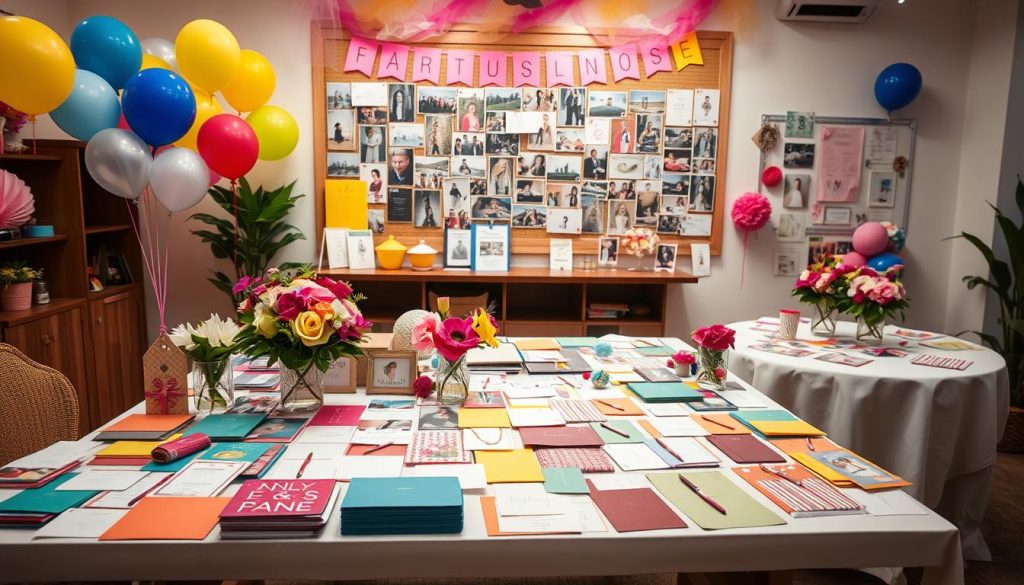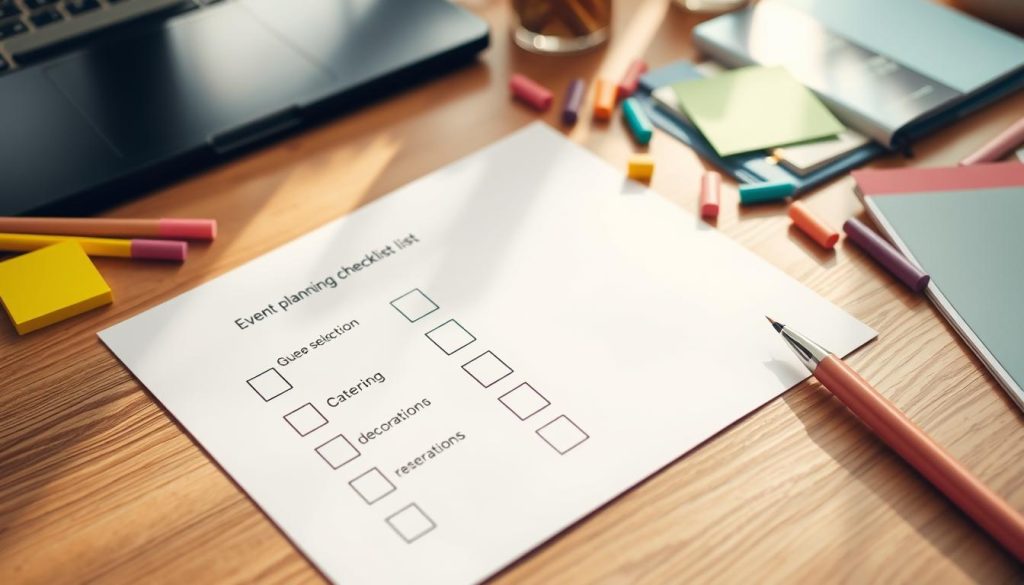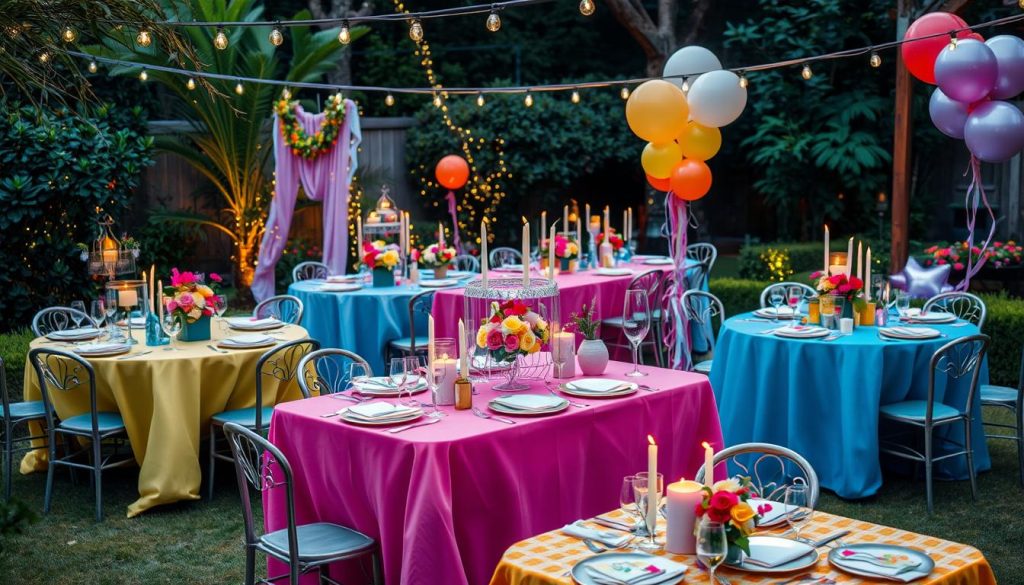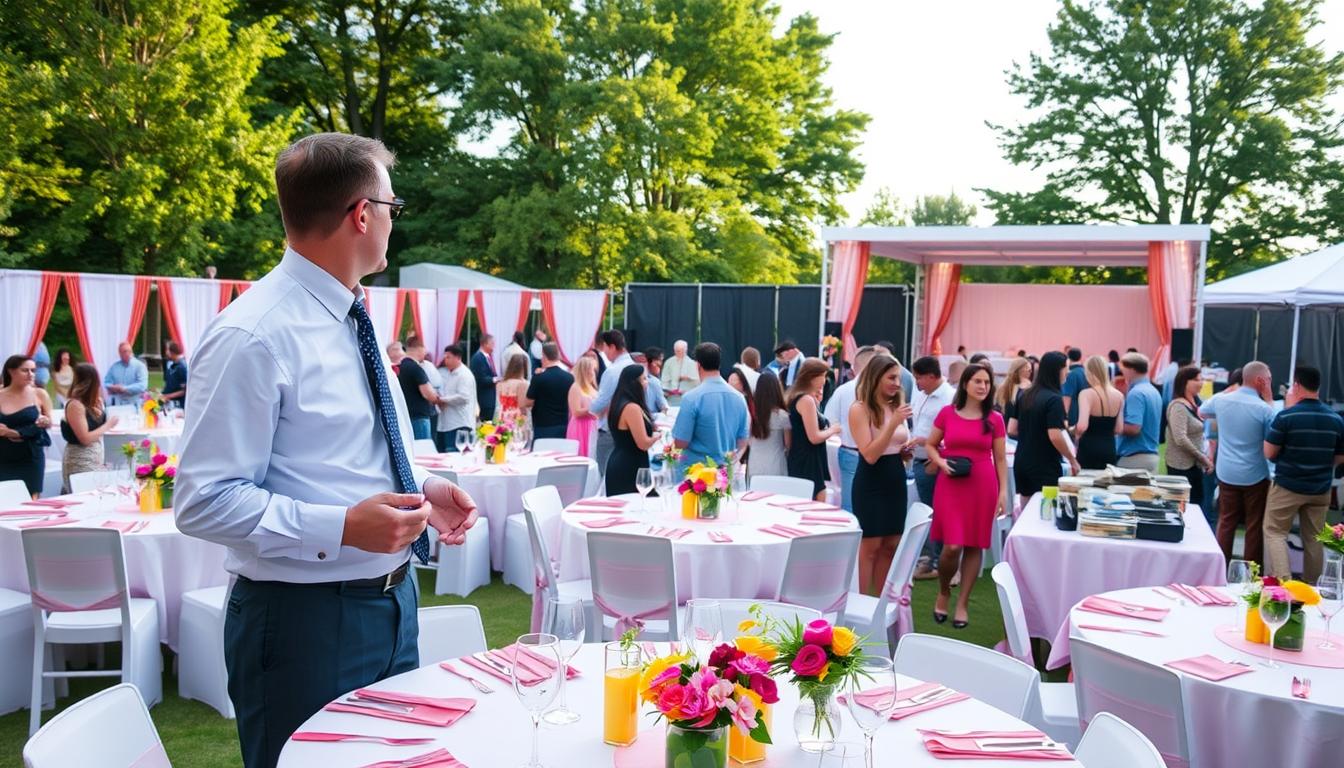Welcome! Are you excited about planning an unforgettable event? This guide will help you master the art of event coordination. It’s packed with practical tips for every stage of party planning.
Whether it’s a small family gathering or a big event, knowing how to plan is crucial. I’ll show you how to pick the right venue and create a guest list that makes everyone happy. Let’s start and make your next event unforgettable!
Understanding the Importance of Events and Celebrations
Celebrating life’s big moments through events and celebrations is something we all do. These gatherings help us mark important personal wins and honor traditional holidays. They also give us chances to connect, reflect, and find joy, making them key parts of our lives.
Why We Celebrate
Celebrations are a big part of our culture. They let us recognize our achievements and life’s big moments. Whether it’s a birthday, anniversary, or holiday, these events bring us together with our loved ones.
Through these times, we strengthen our bonds and make memories that last. It’s a way to share our special moments and feel connected.
The Impact of Events on Our Lives
The role of events in our lives is huge. Holiday celebrations, for example, bring a sense of tradition and comfort. They remind us of our roots and values.
Also, social gatherings help us feel part of a community. They give us a space to show who we are and what we believe. This boosts our happiness and strengthens our connections with others.
Types of Events to Consider

When planning your next event, think about the wide range of gatherings. There are personal celebrations like birthdays and weddings. And corporate events for networking and company achievements. Community festivals and cultural events also enrich our shared experiences.
Personal Celebrations
Personal celebrations mark special moments in our lives. Like birthdays, weddings, or anniversaries. These events are intimate, focusing on achievements and milestones with loved ones. They create lasting memories.
Corporate Gatherings
Corporate events, like gala and networking events, boost business ties. They celebrate company wins and help with professional growth. The goal is to create a space for both work and fun.
Community Festivals
Community festivals celebrate local culture and spirit. They bring people together for fun and support local businesses. Good event management ensures they run smoothly and engage everyone.
Cultural Events
Cultural events showcase our diverse heritage. They include music festivals, arts events, and ethnic fairs. These events educate and entertain, honoring traditions and broadening our views.
Planning Your Event: The Basics

Starting with a solid foundation is key to a successful event. You need to focus on the basics like setting a date, creating a budget, and picking the right venue. These steps are crucial for your event’s success.
Setting a Date and Time
Choosing the right date and time is vital. Make sure your guests are available and there are no other big events happening. Weekdays or weekends might impact who can come, so pick wisely based on your event and audience.
Creating a Budget
Creating a budget is the first step in financial planning. List all costs, like venue, food, entertainment, and decorations. Keeping track of these helps avoid overspending. Having a little extra money set aside can also help with unexpected expenses.
Choosing a Venue
Choosing the right venue is essential. It should match your event’s theme and hold all your guests comfortably. Don’t forget about parking, transportation, and any special needs your guests might have.
Inviting Guests and Building the Guest List
Making your guest list is like creating a work of art. It doesn’t matter if you’re planning a small party or a big event. How well you manage your guest list can make or break your celebration. Let’s explore ways to send out invitations and keep track of who’s coming.
Techniques for Effective Invitations
There are many ways to invite people to your event. You can choose between traditional paper invites or digital ones. The right choice depends on the type of event and what you want to achieve.
- Traditional Paper Invitations: Great for formal events like weddings, adding a personal touch.
- Email Invitations: Good for casual or professional events, making it easy to track responses.
- Social Media Invitations: Use platforms like Facebook Events to invite many people quickly.
Using these methods can make your invitations stand out. They help get your guests excited and eager to attend.
Keeping Track of RSVPs
Tracking RSVPs is crucial for managing your guests well. It helps you plan everything from seating to food. Here are some tips:
- Dedicated RSVP Platforms: Tools like Eventbrite or Paperless Post make tracking easy and provide updates in real-time.
- Excel Spreadsheets: A simple way to keep track of who’s coming and what they prefer.
- Automated Reminder Emails: Send reminders to guests to ensure they don’t forget to RSVP.
| Method | Advantages | Best For |
|---|---|---|
| Traditional Paper Invitations | Elegant, personal touch | Formal events like weddings |
| Email Invitations | Convenient, efficient | Casual or professional gatherings |
| Social Media Invitations | Broad reach, instant communication | Large, informal events |
| Dedicated RSVP Platforms | Streamlined tracking, real-time updates | Any event |
By managing your guests well and tracking RSVPs carefully, your event will be a success. It will meet everyone’s expectations and be unforgettable.
Themes and Decorations for Every Occasion

Creating the perfect ambiance for any event is key for a memorable time. With thoughtful event themes and creative decorations, you can take your guests on a journey. Personalizing events adds a special touch. Let’s look at some ideas to make your gathering unforgettable.
Ideas for Personal Touches
Personalizing events makes guests feel special and connected. Here are some ideas for adding personal touches:
- Customized Invitations: Design invitations that match your event’s theme and include a personal message for each guest.
- Name Placards: Create individual name placards with detailed designs that also serve as keepsakes.
- Personalized Party Favors: Give gifts that have a personal connection to either the host or the guest.
Seasonal Themes to Explore
Seasonal themes are always popular because they match the natural ambiance of the time. They help create cohesive and immersive experiences. Here are some seasonal ideas:
- Spring Blossoms: Use pastel colors and lots of flowers to bring spring’s freshness to your venue.
- Summer Beach Party: Add beach balls, tiki bars, and tropical flowers for a relaxing beach vibe.
- Autumn Harvest: Use pumpkins, earthy tones, and rustic decorations for a cozy fall event.
- Winter Wonderland: Include snowflakes, icicles, and warm lighting for a magical winter theme.
By mixing well-chosen event themes with creative decorations, you boost your event’s visual appeal. You also ensure a memorable and engaging experience for your guests.
Catering and Refreshments: Feeding the Crowd
Great food is key to a successful event. Good event catering not only feeds your guests but also makes a lasting impression.
Choosing the Right Menu
Menu planning is crucial for a smooth event. Start by thinking about your event’s type and your guests’ tastes. Choose dishes that match your event’s mood. Offering a variety of options can make your food service a big hit.
- Buffets: Great for big groups, offering lots of choices and letting guests serve themselves.
- Plated Meals: Best for formal events, adding elegance with structured courses.
- Finger Foods: Ideal for casual events, making it easy for guests to mingle.
Special Dietary Considerations
It’s important to consider dietary restrictions in your menu. This makes sure everyone feels included and comfortable. Make sure to talk to your caterers about these needs early on. This shows you care and helps leave a good impression.
- Check if your caterer knows how to handle dietary restrictions.
- Make sure to label dishes so guests know what they’re eating.
- Provide a range of drinks to match different diets.
In summary, paying close attention to event catering can make your event memorable. By planning your menu well and considering dietary needs, you’ll ensure everyone enjoys their meal.
Entertainment Options to Enhance Your Event
Entertainment is key to any event. Whether it’s live shows or DJ beats, the right choice sets the mood. Adding fun activities for guests can make your event truly special.
Live Performances vs. DJ Services
Choosing between live bands and DJ services is important. Live bands offer a real musical experience, perfect for memorable moments. They connect with the audience, adding a personal touch.
DJ services, on the other hand, offer flexibility and a wide music selection. They keep the party going with customized playlists. Both live bands and DJ services can make your event unforgettable.
Fun Activities for Guests
Adding guest activities can make your event even better. Interactive games, photo booths, and craft stations are great choices. They offer fun and memorable experiences for all.
- Interactive Games: Team-building exercises and competitive challenges to keep the crowd engaged.
- Photo Booths: Capture fun moments with props and custom backdrops.
- DIY Craft Stations: Encourage creativity with hands-on activities.
By carefully choosing entertainment and activities, you can create a memorable event. It will be fun and engaging for everyone.
Reviewing and Reflecting Post-Event
The event may be over, but the journey doesn’t end there. Reflecting on your event can provide invaluable insights. It ensures continuous improvement for future occasions. Let’s delve into the critical steps of gathering meaningful feedback and documenting those cherished memories.
Gathering Feedback
Collecting event feedback is a cornerstone of successful event planning. By reaching out to your guests and asking for their perspectives, you can gather invaluable data. This helps to identify what worked well and what areas need improvement.
You can use online surveys, social media polls, or even direct communication methods like email to solicit opinions. The insights gained will not only guide your planning process but also reinforce relationships with your guests.
Documenting Your Memories
Memory preservation is another crucial post-event activity. Capturing the highlights of your event through photographs, videos, and written reflections ensures that the essence of the event lives on. These documented memories are not only great for reminiscing but also serve as a powerful marketing tool for future events.
Incorporate these memories into a photo album, a blog post, or even a social media recap. This way, you can celebrate the event’s success and share it with a wider audience.
By focusing on event feedback and memory preservation, you are not just closing one chapter but also laying a robust foundation for your future events. Implement these practices to keep improving your event planning journey.
